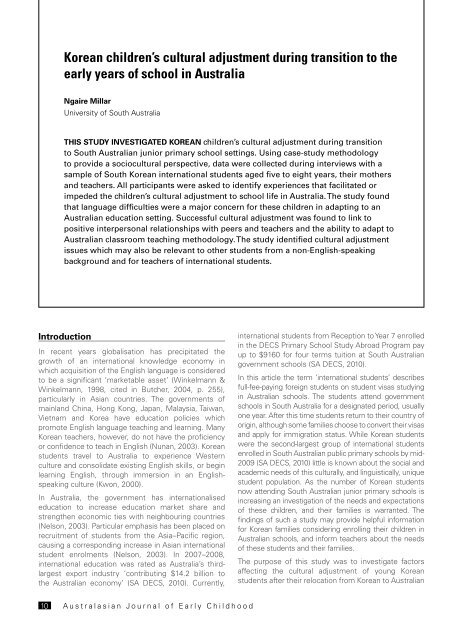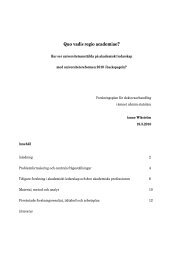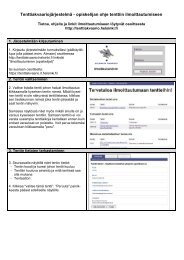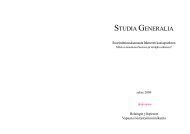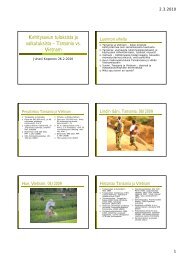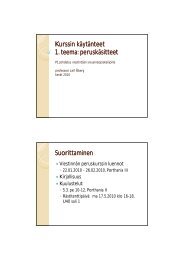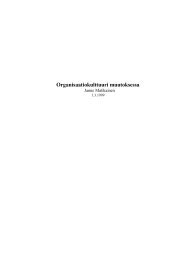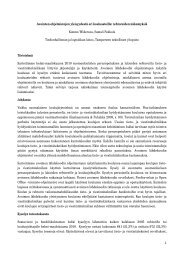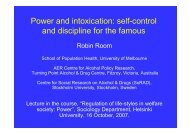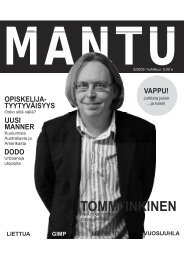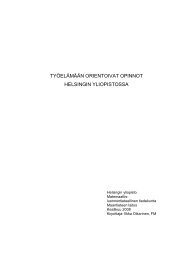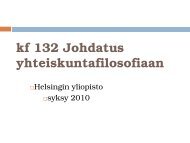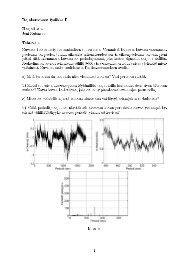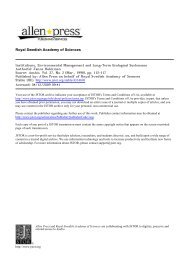Korean children’s cultural adjustment during transition to theearly years <strong>of</strong> school in AustraliaNgaire MillarUniversity <strong>of</strong> South AustraliaThis study investigated Korean children’s cultural adjustment during transitionto South Australian junior primary school settings. Using case-study methodologyto provide a sociocultural perspective, data were collected during interviews with asample <strong>of</strong> South Korean international students aged five to eight years, their mothersand teachers. All participants were asked to identify experiences that facilitated orimpeded the children’s cultural adjustment to school life in Australia. The study foundthat language difficulties were a major concern for these children in adapting to anAustralian education setting. Successful cultural adjustment was found to link topositive interpersonal relationships with peers and teachers and the ability to adapt toAustralian classroom teaching methodology. The study identified cultural adjustmentissues which may also be relevant to other students from a non-English-speakingbackground and for teachers <strong>of</strong> international students.IntroductionIn recent years globalisation has precipitated thegrowth <strong>of</strong> an international knowledge economy inwhich acquisition <strong>of</strong> the English language is consideredto be a significant ‘marketable asset’ (Winkelmann &Winkelmann, 1998, cited in Butcher, 2004, p. 255),particularly in Asian countries. The governments <strong>of</strong>mainland China, Hong Kong, Japan, Malaysia, Taiwan,Vietnam and Korea have education policies whichpromote English language teaching and learning. ManyKorean teachers, however, do not have the pr<strong>of</strong>iciencyor confidence to teach in English (Nunan, 2003). Koreanstudents travel to Australia to experience Westernculture and consolidate existing English skills, or beginlearning English, through immersion in an Englishspeakingculture (Kwon, 2000).In Australia, the government has internationalisededucation to increase education market share andstrengthen economic ties with neighbouring countries(Nelson, 2003). Particular emphasis has been placed onrecruitment <strong>of</strong> students from the Asia–Pacific region,causing a corresponding increase in Asian internationalstudent enrolments (Nelson, 2003). In 2007–2008,international education was rated as Australia’s thirdlargestexport industry ‘contributing $14.2 billion tothe Australian economy’ (SA DECS, 2010). Currently,international students from Reception to Year 7 enrolledin the DECS Primary School Study Abroad Program payup to $9160 for four terms tuition at South Australiangovernment schools (SA DECS, 2010).In this article the term ‘international students’ describesfull-fee-paying foreign students on student visas studyingin Australian schools. The students attend governmentschools in South Australia for a designated period, usuallyone year. After this time students return to their country <strong>of</strong>origin, although some families choose to convert their visasand apply for immigration status. While Korean studentswere the second-largest group <strong>of</strong> international studentsenrolled in South Australian public primary schools by mid-2009 (SA DECS, 2010) little is known about the social andacademic needs <strong>of</strong> this culturally, and linguistically, uniquestudent population. As the number <strong>of</strong> Korean studentsnow attending South Australian junior primary schools isincreasing an investigation <strong>of</strong> the needs and expectations<strong>of</strong> these children, and their families is warranted. Thefindings <strong>of</strong> such a study may provide helpful informationfor Korean families considering enrolling their children inAustralian schools, and inform teachers about the needs<strong>of</strong> these students and their families.The purpose <strong>of</strong> this study was to investigate factorsaffecting the cultural adjustment <strong>of</strong> young Koreanstudents after their relocation from Korean to Australian10A u s t r a l a s i a n J o u r n a l o f E a r l y C h i l d h o o d
education settings. The term ‘cultural adjustment’may be described as ‘cultural involvement and ethnicidentity behaviour’ displayed through cultural practicessuch as social activities, customs, food (Sonderegger& Barrett, 2004, p. 352) and language (Renwick, 1997).Previous research has indicated that cultural adjustmentis affected by self-esteem, anxiety, social support,self-description, ethnic identity, and acculturation(Sonderegger & Barrett, 2004).Most Australians have little or no knowledge aboutKorean culture or lifestyle. Therefore, most Australianteachers may have difficulty addressing the needs<strong>of</strong> children from this ethnic group (Armitage, 1999).In order to specifically meet the needs <strong>of</strong> Koreanstudents (Dooley, 2003), early childhood educatorsneed to become aware <strong>of</strong> the factors affectingsuccessful cultural transition into Australian educationsettings (Okagaki & Diamond, 2000) and to developsome understanding <strong>of</strong> the nature <strong>of</strong> education incontemporary Korean society.In Korean society and education settings, relationshipsare vertically structured and patrilineal, reflectingConfucian values (Armitage, 1999). Korean parentshave high expectations for their children’s academicachievements (Kwon, 2000). Korean children are taughtto fulfil familial duties <strong>of</strong> obedience, attention andhonour. In return, Korean mothers devote themselvesto their children’s education and fathers provide socialposition, family leadership and decision making (Kim &Choi, 1994). The strength <strong>of</strong> adult–child relationshipsis also evident in the important bond between teacherand student. Like the child–parent connection, therapport between student and teacher is founded onConfucian values (Kwon, 2000).Koreans spend much money on their children’s education(Kim, 2004). Families <strong>of</strong>ten spend up to one-third <strong>of</strong> theirhousehold income on private tuition in art, music andEnglish (Nunan, 2003). Outside regular school hoursmany children attend intensive classes, particularly inEnglish, at private academies known as hagwon. In 2000,approximately 60 per cent <strong>of</strong> Korean students attendedsome form <strong>of</strong> hagwon (Kim, 2004). Anecdotal evidencesuggests many Korean parents are dissatisfied with theircountry’s contemporary English language curriculum,which is based predominantly on reading and grammar,so some choose to have their children educated inAustralia to acquire English oral language skills (Tran,2006). Previous research about the transition <strong>of</strong> Koreanstudents into Australian schools has mainly focusedon the experiences <strong>of</strong> secondary and tertiary students(Armitage, 1999; Kwon, 2000). To date, research withyounger Korean children has been limited to exploration<strong>of</strong> mother–child relationships in preschool settings (Rodd,1996). Therefore, this study focuses on the culturaltransition <strong>of</strong> young children in early childhood settings.Children studying in a country other than theirown encounter a variety <strong>of</strong> barriers they need toovercome to achieve social and academic success.Renwick (1997) suggests that poor English languagepr<strong>of</strong>iciency is the issue which most crucially affectsKorean students’ adjustment to Western educationenvironments. Studies <strong>of</strong> tertiary Asian internationalstudents in Australia indicate that English languageproblems seriously affect students’ social competenceand academic progress (Sawir, 2005; Wong, 2004). Aninability to communicate confidently in English presentsmyriad difficulties for tertiary students. In the presentstudy it was expected that similar problems may beencountered by younger students.In Korea, early literacy education has traditionallyused rote-learning (Lee, Park & Kim, 2000). Children’seducation experiences are usually teacher-directedand highly competitive (Kwon, 2000). In Australia,early childhood education teachers incorporate socialconstructivist approaches which emphasise languagerich,activity-based, interactive learning. This pedagogicalmethodology is based on sociocultural theory whichstates that successful close interpersonal relationshipsare critical to effective cross-cultural learning (Lim &Renshaw, 2001). In many Australian early childhoodclassrooms social constructivist approaches are evidentin the use <strong>of</strong> collaborative learning. In collaborativeclassrooms competition is not valued. Less importanceis placed on individual goals and achievement (Hill,1994). A growing body <strong>of</strong> evidence also indicates theimportance <strong>of</strong> social interaction during play (Bodrova,Leong, Hensen & Henninger, 2000).Australian settings <strong>of</strong>ten incorporate a play-centredcurriculum which stimulates children’s cognitive andsocial development while they participate in socialinteraction during planned play experiences (Van Hoorn,Monighan Nourot, Scales & Rodriguez Alward, 2003).Okagaki and Diamond (2000) have suggested that theactivities incorporated in play curricula, such as use <strong>of</strong>manipulatives, are beneficial for all children, particularlythose learning English as a second language. The use<strong>of</strong> small groups for play and structured activities alsoallows children to observe and follow peers’ modelling(Okagaki & Diamond, 2000). In addition to teachingand learning principles, based on social interaction, thepartnerships between teachers and parents <strong>of</strong> youngchildren are crucial to the children’s social and academicsuccess. Improved learning outcomes may be achievedwhen children see positive relationships between theirparents and teachers (Billman, Geddes & Hedges,2005). Australian junior primary school teachers <strong>of</strong>tenencourage parents and families to participate in theclassroom by listening to children read in the morningor assisting with a range <strong>of</strong> class activities.Vo l u m e 3 6 N u m b e r 3 S e p t e m b e r 2 011 11
- Page 3 and 4: 1.5 Display, download or print the
- Page 5 and 6: Volume 36 Number 3 September 2011Jo
- Page 7 and 8: Curriculum guidelines for early lit
- Page 9 and 10: ■■Know that print carries meani
- Page 16 and 17: The Early Years Learning Framework
- Page 18: Kyung Min said listening in class w
- Page 21 and 22: immediately impact on children’s
- Page 23 and 24: Child participation in the early ye
- Page 25 and 26: their kindergarten day. A study by
- Page 27 and 28: the overall organisation, routines,
- Page 29 and 30: Council of Australian Governments (
- Page 31: Learning to measure length in the f
- Page 34 and 35: ■■a 40-minute, one-on-one inter
- Page 36 and 37: ■■72 per cent of the project sc
- Page 38 and 39: In other words, the difficulties th
- Page 40 and 41: An analysis of New Zealand’s chan
- Page 42 and 43: Before five also gave equivalent st
- Page 44 and 45: some evidence that curriculum effec
- Page 46 and 47: achievement; aiding transition to s
- Page 49 and 50: ‘It’s a mystery!’A case study
- Page 51: analysis of discourse the children
- Page 56 and 57: ange of objects on the floor (such
- Page 58 and 59: Observation and recording informati
- Page 60 and 61: ‘I’m making it different to the
- Page 62 and 63:
Purpose and theoretical frameworkIn
- Page 64 and 65:
The fingers were reaching out acros
- Page 66 and 67:
Figure 7. ‘I take this lovely lad
- Page 68 and 69:
Here, Rachel used substitution to r
- Page 70:
Evaluating the feasibility, effecti
- Page 73 and 74:
Table 2. Descriptive characteristic
- Page 75 and 76:
The children in this study were fro
- Page 77 and 78:
Vol. 36 No. 3 September 2011Austral
- Page 79 and 80:
implement the curriculum effectivel
- Page 81 and 82:
Table 2. Mean differences between H
- Page 83 and 84:
can be regarded as one of the infor
- Page 85 and 86:
Ganser, T. (2000). An ambitious vis
- Page 87 and 88:
(Buckhalt et al., 2009). Reduced qu
- Page 89 and 90:
invited families having difficulty
- Page 91 and 92:
Table 3. Mean hours of mother and f
- Page 93 and 94:
A reduction in night wakings might
- Page 95 and 96:
A preliminary exploration of childr
- Page 97 and 98:
adult support necessary for its eff
- Page 99 and 100:
Children’s cortisol and alpha-amy
- Page 102 and 103:
Connor, C., Son, S.-H., Hindman, A.
- Page 104 and 105:
Equity of access:Requirements of In
- Page 106 and 107:
excursions, which have been reporte
- Page 108 and 109:
We need a bus but we also need a st
- Page 110 and 111:
Appropriate child careIndigenous fa
- Page 112 and 113:
Australian Institute of Health and
- Page 114 and 115:
The Mosaic Approach relies on child
- Page 116 and 117:
participants (Altrichter, Posch, &
- Page 118 and 119:
distance. This involved trying to b
- Page 120 and 121:
Dockett, S., & Perry, B. (2003). Ch
- Page 122 and 123:
experiences (Bandura, 1997). Belief
- Page 124 and 125:
the curriculum while on their profe
- Page 126 and 127:
Exploring and evaluating levels of
- Page 128 and 129:
Level 2: Attending to feelingsThis
- Page 130 and 131:
This process to ensure coder stabil
- Page 132 and 133:
DiscussionStructured reflective pro
- Page 134 and 135:
Rock, T. C., & Levin, B. B. (2002).
- Page 136 and 137:
issues encountered in their caring
- Page 138 and 139:
pertaining to the impact and suppor
- Page 140 and 141:
Parents felt the policies involving
- Page 142 and 143:
and access suitable carers because
- Page 144 and 145:
Ievers, C. E., & Drotar, D. (1996).
- Page 146:
www.earlychildhoodaustralia.org.auE


